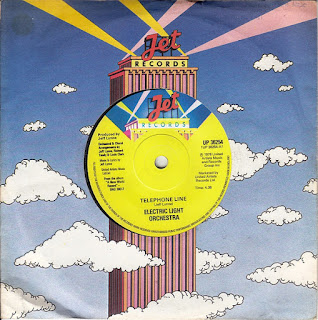ELECTRIC LIGHT ORCHESTRA - TELEPHONE LINE / STRANGE MAGIC
TELEPHONE LINE
Released: May 1977
Charted: UK: #8 US: #7
"Telephone Line" is a song released through Jet Records and United Artists Records as part of the album “A New World Record”. It was the fourth single to be released from the record.
The song expresses a longing for a loved one and the desire to reconnect and hear their voice again. In the song, the narrator expresses their hope to reconnect over the phone after a period of separation and isolation. They also express longing and regret that their relationship is in a kind of twilight, with the love they had fading away due to time and distance. The lyrics reflect a need for comfort and support from the other person, and an eagerness to hear their voice on the other end of the line.
Jeff Lynne said: “I can remember writing this on an old out-of-tune upright piano. I somehow squeezed this song out of it. I sound really desperate and lonely on this one, and maybe I was. It's about trying to find a girl every night and you just can't get through to her. It was a scenario I thought of, but maybe it was prompted by the fact that I wasn't happy at the time. When I was a kid, I loved the plaintive songs of Del Shannon and Roy Orbison. They wrote songs that were really sad and those were the best. I thought I was writing those sort of songs. People tell me the song gives them a boost, but I never dreamed I was doing that for anybody”.
About use an American ring tone during the song Lynne explained: “To get the sound on the beginning, you know, the American telephone sound, we phoned from England to America to a number that we know nobody would be at, to just listen to it for a while. On the Moog, we recreated the sound exactly by tuning the oscillators to the same notes as the ringing of the phone”.
The sonic details in “Telephone Line” are lined up with meticulous care – every doo-wop backing vocal, every violin surge, every digital telephone ring, every dramatic chord change. “Hello, how are you?” Lynne asks up front, his voice masked by phone noise. Then the treble fades – “That’s what I’d say” – revealing his question as fantasy. “Telephone Line” is perpetual twilight – a post-midnight serenade that only grows dreamier as the years pass.
STRANGE MAGIC
Released: February 1976 (US) July 1976 (UK)
Charted: UK: #38 US: #14
“Strange Magic” it’s a song featured on ELO's fifth studio album “Face the Music”. It was released as a single the following year, and despite only charting at 38 in the UK, has become one of their most popular and famous ballads, not only is a highlight of the band's first Top 10 album, it also marked a turning point in their career. After testing a couple of commercial pop songs on the previous album 1974's Eldorado, the group jumped into more radio-friendly tracks on “Face the Music”. This is one of the best.
The song refers to the fascination with a particular woman, describing the feeling you get when you first fall in love, with lyrics such as: "You're walking meadows in my mind, making waves across my time. I get a strange magic". Describing this love as walking meadows is thought to refer to this person taking up all of his thoughts, with the scale of the meadows indicating they're walking through them constantly. The infectious beat of the song also mirrors the exciting spirit that comes with falling in love. Overall, "Strange Magic" delves into the enchanting and otherworldly aspects of romantic attraction, suggesting that it has the power to transport individuals to a realm beyond the ordinary, where logic and understanding are replaced by the inexplicable and captivating forces of love.
“Strange Magic” is arguably the most George Harrison-esque track that Jeff Lynne ever penned, slightly serendipitous that they'd later become friends then bandmates when forming the Traveling Wilburys. Billboard considered it to be an "easy rocker" with "smooth vocals and skillful string arrangements". Record World said that "an immaculate production by Jeff Lynne maintains the high caliber of the group's recorded work”.





















Cap comentari:
Publica un comentari a l'entrada